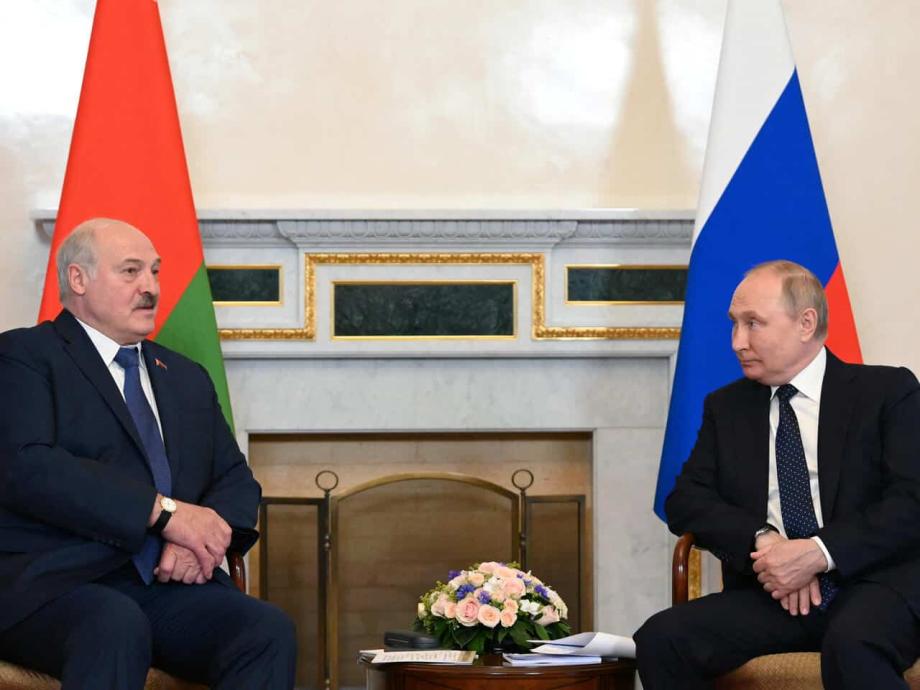New Hybrid Threats from Lukashenko: How Should the West React?

At the beginning of July, Europeans found themselves facing yet another series of threats from the illegitimate President of Belarus, Alexander Lukashenko. Marking the Independence Day of Belarus, the dictator Lukashenko went public with statements that Russia and Belarus pursue deepened integration under the Union State, which already resulted in the joint grouping of armed forces. All these declarations have been made against the backdrop of the ongoing mobilization exercises in Belarus alongside its border with Ukraine. How should the European community read these messages?
Political dimension
Since August 2020, the European Union has sought to work out a credible strategy on how to deal with Lukashenko and his highly repressive state apparatus. A number of sanctions and restrictions discussed within the EU and individual member-states did not come to fruition. While European leverages in Belarus shrank, the Russian influence became stronger. Rapprochement with Russia served as the only security guarantee for Lukashenko. Along with harsh criticism and conspiracy theories about the West and Ukraine, the Belarusian dictator incrementally lost state sovereignty.
However, bold statements are not new to Lukashenko’s rhetoric he has been using since the start of the full-fledged Russian aggression toward Ukraine. Direct involvement in this war on the Russian side prompts him to search for arguments to justify his position. The core propaganda message is that Russia and Belarus were under an imminent risk of military assault from Ukrainian territory. That’s why Moscow had to act immediately with its “special military operation” and with official support from Minsk. After the Russian invasion accompanied by active Belarusian involvement, there is no longer any illusion that Lukashenko’s regime is in full control of the state. But at the same time, he is afraid of the Kremlin’s expansion to Belarus’ domestic affairs as well as of internal societal disorder.
The war against Ukraine is very unpopular in Belarus, and Lukashenko is fully aware of this. That is why he prefers to act through hybrid operations. On the one hand, he tries to appease Vladimir Putin by consenting to use Belarusian territory and airspace. On the other hand, he resists the Russian pressure to join the ground offensive in Ukraine. This may be, to some extent, the reason why he is so belligerent in his words but rather reserved in deploying the Belarusian army. Lukashenko periodically makes new threats to Ukraine, Poland, and the Baltic States. In doing so, he plays into Putin’s hands.
Military and security dimension
Lukashenko has dragged Belarus into the war on multiple levels. Under the disguise of joint Russian-Belarusian military drills, he let the thousands of Russian troops to cross the Ukrainian border and start their offensive from Belarusian territory. While keeping the boots of Belarusian soldiers away from stepping on Ukrainian soil, Lukashenko has allowed his country’s territory to be used for air and ground launches of Russian missiles on Ukrainian civilian and military targets and agreed on the use of Belarusian infrastructure for the transportation of Russian heavy weapons and munition to Ukraine.
The situation changed in April when the Kremlin had to withdraw its military from Kyiv, Chernihiv, and Sumy areas and deployed them to the eastern part of Ukraine. Following this move, Russian units in Belarus were also assigned to new operational areas. At present, there are no Russian military reserves to organize and conduct a similar offensive along the northern part of the Ukrainian border. But Kremlin still uses Belarusian ground and airspace to launch missile attacks. With his own limited military resources, Lukashenko is incapable of starting and sustaining any offensive on Ukrainian soil. Currently, under all the preconditions of military and mobilization drills, Belarus amassed only up to 7 battalions of its armed forces.
In May, Lukashenko announced plans to establish the Southern operational command in regions bordering Ukraine. Accordingly, the number of Belarusian military manpower is planned to increase from the current 45.000 soldiers to 80.000. Even if this is not merely a part of a disinformation campaign, these steps cannot be properly implemented in a short-term perspective. But one should keep in mind that the current absence of the imminent threat of active Belarusian involvement in the fighting in Ukraine does not exclude such a possibility in the future. Especially, if Russian forces make significant advances in the east and south of Ukraine. Moreover, we have to consider the increasing number of Russian air forces stationed in Belarus as well as Putin’s wows to deliver Iskander-M missiles capable of carrying nuclear weapons to Belarus in the coming months. This likelihood must prompt the EU capitals and Ukraine to adopt some preparatory steps to minimize the potential risks coming from Belarus.
Policy recommendations:
- The EU leaders must apply the same severity of sanctions to both Russia and Belarus, sealing all the loopholes to bypass this sanctions regime.
- A crucial role will be played by the joint effort to create ad hoc international criminal tribunal. This instrument is very essential to hold Putin accountable for the atrocities committed in Ukraine.
- More attention to the Belarusian case might be paid during the Czech Presidency in the EU Council in the second half of 2022. Since the official dialogue with Belarus is frozen, Brussels has to address more profoundly the civil society sector in Belarus. Although it was clear from 2020 that the Eastern Partnership would not fit any Belarus state presence in this policy, it is crucial to earmark more support for Belarusian NGOs, politicians, and activists who fled from Lukashenko’s dictatorship.
- Special attention should be paid to the recent cases of death penalties for Belarusian citizens who have been accused by the regime of the destruction of railway infrastructure in order to disrupt Russian military logistic chains. The European community has to find ways to save the lives of these Belarusians who stood against the Russian aggression and its partner in crime - Belarus.
